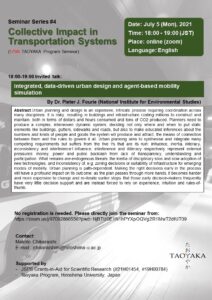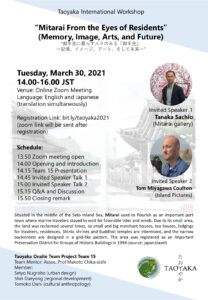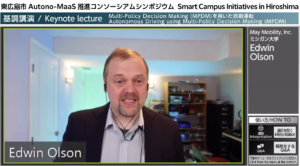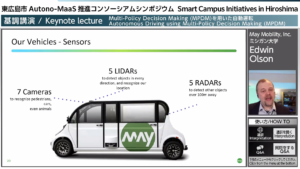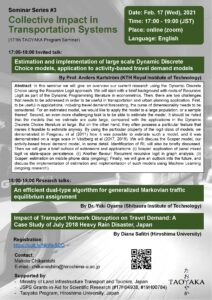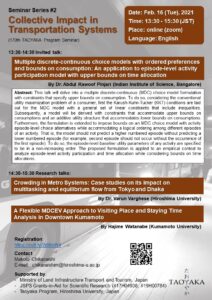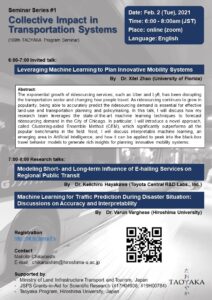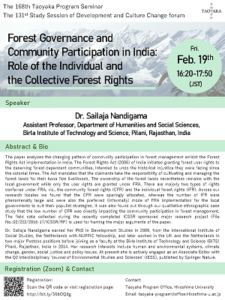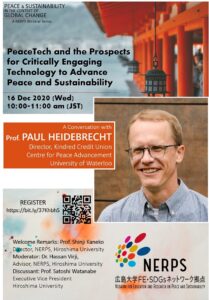News(EVENT)
(July 5) The 175th Taoyaka Program Seminar will be held
The 175th Taoyaka Program Seminar will be held on July 5th.
In this seminar, Dr. Pieter J. Fourie will talk under the theme of Integrated, data-driven urban design and agent-based mobility simulation.
We hope many of you attend the webinar.
■ Date: Monday, July 5, 18:00-19:00, (JST)
■ Theme : Integrated, data-driven urban design and agent-based mobility simulation
■ Speaker:Dr. Pieter J. Fourie, Ex-researcher at National Institute for Environmental Studies
■ Language: English
■ Venue: Online (Zoom)
https://zoom.us/j/97092866556?pwd=NjBTU0E1N1hPYXpOQVg2R1MwT2dtUT09
Meeting ID: 970 9286 6556
Passcord: 456856
■ Abstract
Urban planning and design is an expensive, intricate process requiring coordination across many disciplines. It is risky, resulting in buildings and infrastructure costing millions to construct and maintain, both in terms of dollars and hours consumed and tons of CO2 produced. Planners need to produce a complex, interwoven dynamic system; deciding not only where and when to put static elements like buildings, gutters, sidewalks and roads, but also to make educated inferences about the numbers and kinds of people and goods the system will produce and attract, the means of connection between them and the rules to govern it all. Urban planning aims to synthesise and integrate many competing requirements but suffers from the five ‘i’s that are its ruin: influence, inertia, illiteracy, inconsistency and interference1.Influence, interference and illiteracy respectively represent external pressures: money, power and public backlash from lack of transparency, understanding and participation. What remains are endogenous threats: the inertia of disciplinary silos and slow adoption of new technologies, and inconsistency of, e.g. zoning decisions or suitability of infrastructure for emerging modes of mobility. Urban planning is path-dependent. Making the right decisions early in the process will have a profound impact on its outcome: as the plan passes through more hands, it becomes harder and more expensive to change and re-iterate earlier steps. But those early decision-makers frequently have very little decision support and are instead forced to rely on experience, intuition and rules-of-thumb.
12th International Workshop (Team 15)
- Title: Mitarai from the Eyes of Residents (Memory, Image, Arts, and the Future)
- Date & Time: 14:00-16:00 (JST) Friday March 30, 2021
- Venue: Zoom
Registration page:
https://zoom.us/meeting/register/tJAlceyprTspGdPeZcySY7v7JfsI7A0mURkS
Program Schedule:
13:50 Zoom meeting open
14:00 Opening and introduction
14:15 Team 15 Presentation
14:45 Invited Speaker Talk 1
15:00 Invited Speaker Talk 2
15:15 Q&A and Discussion
15.50 Closing remark
Higashi-Hiroshima Autono-MaaS Consortium Smart Campus Initiatives in Hiroshima was held
On Wednesday, March 10, 2021, Higashi-Hiroshima Autono-MaaS Consortium held a symposium, Smart Campus Initiatives in Hiroshima, co-hosted by the Higashi-Hiroshima City, Hiroshima University, Town & Gown Office Higashi-Hiroshima and Taoyaka Program.
This symposium invited experts from Japan and abroad to share the impact of advanced technologies such as autonomous driving and smart energy toward the development of sustainable communities.
The event started with an opening remarks by the President of Hiroshima University, followed by a congratulatory speech of a Mayor of Higashi-Hiroshima. During the consortium, the speakers introduced their experiments in transportation system or energy problems in different places from different academic perspectives. These problems are important issues to develop sustainable communities.
Active discussions were held among the speakers and the discussants. There were approximately 200 participants in the consortium.
(March. 10) Higashi-Hiroshima Autono-MaaS Consortium
Smart Campus Initiatives in Hiroshima
Toward the development of sustainable communities, the challenges revolve around accessible transportation systems and clean energy are crucial issues to be solved and are also vigorously researched in academia through research study and demonstration experiments conducted from various approaches in various places.
In March 2021, Hiroshima University will also initiate a demonstration experiment of MaaS (Mobility as a Service), which is an efficient and accessible transportation system using the Information and Communication Technology (ICT) or AI, in cooperation with Higashi-Hiroshima City, Izumi Co., Ltd., and MONET Technologies Inc.
In this symposium, experts from Japan and overseas will talk about the prospects of advanced technologies brought to our research and lives such as autonomous driving and smart energy to get a glimpse of our future.
Date and Time: Wednesday, March 10th, 2021 13:00 – 16:50 (JST)
Venue: Hiroshima University (Capacity of 30 audiences) and Online live streaming
Language: Japanese and English (Simultaneous translation provided)
Intended audience: Faculties, Students, General audience
Participation fee: Free of charge (Online pre-registration is required)
Organizer: Higashi-Hiroshima Autono-MaaS Consortium
Co-host: Hiroshima University, Higashi-Hiroshima City, Town & Gown office Higashi-Hiroshima, TAOYAKA Program
Program
| 13:00 | Opening Remarks Mitsuo Ochi, President, Hiroshima University |
| 13:05 | Congratulatory Speech Hironori Takagaki, Mayor of Higashi-Hiroshima City |
| 13:10 | Project Overview Akimasa Fujiwara, Vice President (Academy of Hiroshima University), Hiroshima University |
| 13:25 | Keynote Lecture “Autonomous Driving using Multi-Policy Decision Making (MPDM)” Edwin Olson, CEO and Co-Founder of May Mobility, Inc. Professor of Electrical Engineering and Computer Science at the University of Michigan |
| 14:15 | Mobility Innovation Yoshihide Shibao, Representative Director and COO, MONET Technologies Inc. |
| 15:05 | Smart City Initiatives at Haneda Innovation City and Future Prospects Atsushi Kato, General Manager of Project Department of Real Estate Development Division, KAJIMA CORPORATION |
| 15:45 | Carbon Neutral × Smart Campus 5.0 Declaration Masamichi Takase, Manager, Energy Service Team, Zero Emission Business Dept., SUMITOMO CORPORATION |
| 16:25 | Sustainable University Town Driven by Academic Enterprise Model Shinji Kaneko, Vice President (Global Initiatives), Hiroshima University |
| 16:45 | Closing Remarks Shinichi Tate, Executive Vice President (Research and Academia-Government-Community Collaboration), Hiroshima University |
Online Registration
Contact
TAOYAKA Program Office, Hiroshima University
email:taoyaka-program*office.hiroshima-u.ac.jp (Please replace * with @.)
(March. 6) The 173th Taoyaka Program Seminar will be held
The 173th Taoyaka Program Seminar will be held on March 6th.
In this seminar, Dr. BINU SUNDAS, Assistant Professor, University of Delhi, will talk under the theme of Dynamics of Agriculture Market Relations in India in the first lecture. Dr. Niraj Prakash Joshi will talk about Development of Agriculture and Agricultural Markets in Nepal in the second lecture.
Admission free and pre-registration is needed.
We hope many of you attend the webinar.
■ Date: Saturday, March 6, 2021 13:00-15:20 (JST)
■ Theme 1: Dynamics of Agriculture Market Relations in India
■ Speaker: Dr. BINU SUNDAS, Assistant Professor, University of Delhi
■ Theme 2: Development of Agriculture and Agricultural Markets in Nepal
■ Speaker: Dr. Niraj Prakash Joshi, Associate Professor, Hiroshima University
■ Language: English
■ Registration: (Zoom) :For registration, please send an email to; hindas@hiroshima-u.ac.jp to get the Zoom meeting ID and password. Email title must be ‘HINDAS 6th Regular Seminar’. Include your name and affiliation in the email.
(Feb. 17) The 171th Taoyaka Program Seminar will be held
The 171th Taoyaka Program Seminar – Collective Impact in Transportation Systems (Seminar Series 3) – will be held online on February 17th.
Admission free and pre-registration is needed. We hope many of you attend the seminar.
- Date: Wednesday, February 17, 17:00-19:00 (JST)
- Invited Talk: Estimation and implementation of large scale Dynamic Discrete Choice models, application to activity-based travel demand models
Prof. Anders Karlström (KTH Royal Institute of Technology) - Research Talks:
An efficient dual-type algorithm for generalized Markovian traffic equilibrium assignment (Dr. Yuki Oyama (Shibaura Institute of Technology)
Impact of Transport Network Disruption on Travel Demand: A Case Study of July 2018 Heavy Rain Disaster, Japan (Diana Safitri, Hiroshima University) - Language: English
- Registration: (Zoom) https://cutt.ly/NkWvSCD
- Sponsor of the seminar:
Ministry of Land Infrastructure Transport and Tourism, Japan
JSPS Grants-in-Aid for Scientific Research (#17H04938, #19H00784) - Organized by: Assoc. Prof. Makoto Chikaraishi (Social Implementation Course)
(Feb. 16) The 170th Taoyaka Program Seminar will be held
The 170th Taoyaka Program Seminar – Collective Impact in Transportation Systems (Seminar Series 2) – will be held online on February 16th.
Admission free and pre-registration is needed. We hope many of you attend the seminar.
- Date: Tuesday, February 16, 2021 13:30-15:30 (JST)
- Invited Talk: Multiple discrete-continuous choice models with ordered preferences and bounds on consumption: An application to episode-level activity participation model with upper bounds on time allocation
Dr. Abdul Rawoof Pinjari, Indian Institute of Science, Bangalore - Research Talks:
Crowding in Metro Systems: Case studies on its impact on multitasking and equilibrium flow from Tokyo and Dhaka (Dr. Varun Varghese, Hiroshima University)
A Flexible MDCEV Approach to Visiting Place and Staying Time Analysis in Downtown Kumamoto (Hajime Watanabe, Kumamoto University) - Language: English
- Registration: (Zoom) https://cutt.ly/2j8BxW4
- Sponsor of the seminar:
Ministry of Land Infrastructure Transport and Tourism, Japan
JSPS Grants-in-Aid for Scientific Research (#17H04938, #19H00784) - Organized by: Assoc. Prof. Makoto Chikaraishi (Social Implementation Course)
(Feb. 2) The 169th Taoyaka Program Seminar will be held
The 169th Taoyaka Program Seminar – Collective Impact in Transportation Systems (Seminar Series 1) – will be held online on February 2nd.
Admission free and pre-registration is needed. We hope many of you attend the seminar.
- Date: Tuesday, February 2, 2021 6:00-8:00AM (JST)
- Invited Talk: Leveraging Machine Learning to Plan Innovative Mobility Systems
Dr. Xilei Zhao, University of Florida - Research Talks: Modeling Short-and Long-term Influence of E-hailing Services on Regional Public Transit
Dr. Keiichiro Hayakawa, Toyota Central R&D Labs., Inc.
Machine Learning for Traffic Prediction During Disaster Situation: Discussions on Accuracy and Interpretability
Dr. Varun Varghese, Hiroshima University - Language: English
- Registration: (Zoom) http://bit.ly/3pnqcFs
- Sponsor of the seminar:
Ministry of Land Infrastructure Transport and Tourism, Japan
JSPS Grants-in-Aid for Scientific Research (#17H04938, #19H00784) - Organized by: Assoc. Prof. Makoto Chikaraishi (Social Implementation Course)
(Feb. 19) The 168th Taoyaka Program Seminar will be held
The 168th Taoyaka Program Seminar will be held on February 19th.
In this seminar, Dr. Sailaja Nandigama from Birla Institute of Technology and Science, Pilani will talk under the theme of Forest Governance and Community Participation in India: Role of the Individual and the Collective Forest Rights
Admission free and pre-registration is needed. We hope many of you attend the webinar.
■ Date: Friday, February 19, 2021 16:20-17:50 (JST)
■ Theme: Forest Governance and Community Participation in India: Role of the Individual and the Collective Forest Rights
■ Speaker: Dr. Sailaja Nandigama, Assistant Professor, Department of Humanities and Social Sciences, Birla Institute of Technology and Science, Pilani, Rajasthan, India
■ Language: English
■ Registration: (Zoom) http://bit.ly/36bOQ4g
■ Abstract:
The paper analyses the changing pattern of community participation in forest management amidst the Forest Rights Act implementation in India. The Forest Rights Act (2006) of India initiated granting forest user rights to the deserving forest dependent communities, intended to undo the historical injustice they were facing since the colonial times. The Act mandates that the claimants take the responsibility of cultivating and managing the forest lands for their bona fide livelihoods. The ownership of the forest lands nevertheless remains with the local government while only the user rights are granted under FRA. There are majorly two types of rights conferred under FRA, viz., the community forest rights (CFR) and the individual forest rights (IFR). Across our research locales we found that the CFR were sparingly allocated, whereas the number of IFR were phenomenally large and were also the preferred (informally) mode of FRA implementation for the local governments to suit their populist strategies. It was also found out through our qualitative ethnographic case study that the low number of CFR was directly impacting the community participation in forest management. The field data collected during the recently completed ICSSR sponsored major research project (File No.:02/252/2016-17/ICSSR/RP) is used for framing the major arguments of the paper.
■ Brief Bio of the Speaker:
Dr. Sailaja Nandigama earned her PhD in Development Studies in 2009, from the International Institute of Social Studies, the Netherlands with NUFFIC fellowship, and later worked in the UK and the Netherlands in two major Postdoc positions before joining as a faculty at the Birla Institute of Technology and Science (BITS) Pilani, Rajasthan, India in 2014. Her research interests include human and environmental systems, climate change, gender, social justice and policy issues. At present she is actively engaged as an Associate Editor with the Q2 interdisciplinary ‘Journal of Environmental Studies and Sciences’ published by Springer Nature. Dr. Nandigama provides her services as an editorial board member of a few international peer reviewed journals, as well as a reviewer of several Scopus indexed journals. She is a member of the Association for Environmental Studies and Sciences (AESS), USA, and Development Studies Association (DSA), UK.
(Sep.23) NERPS Webinar: PeaceTech and the Prospects for Critically Engaging Technology to Advance Peace and Sustainability
The Network for Education and Research on Peace and Sustainability (NERPS) at Hiroshima University will hold a webinar ‘PeaceTech and the Prospects for Critically Engaging Technology to Advance Peace and Sustainability’ as follows.
Admission free and pre-registration is needed. We hope many of you attend the webinar.
■ Date: Wednesday, December 16, 2020 10:00-11:00 (JST)
■ Theme: PeaceTech and the Prospects for Critically Engaging Technology to Advance Peace and Sustainability
■ Lecturer: Prof. Paul Heidebrecht, Director, Kindred Credit Union Centre for Peace Advancement, University of Waterloo
■ Organizer: The Network for Education and Research on Peace and Sustainability (NERPS) , Hiroshima University
■ Language: English
■ Registration: (Zoom) https://bit.ly/37KhbhS
■ Detail: NERPS website






